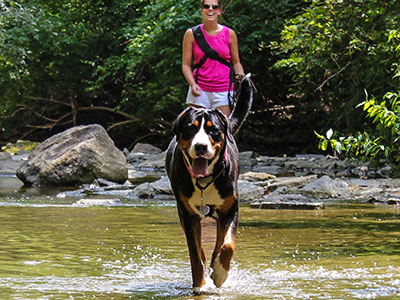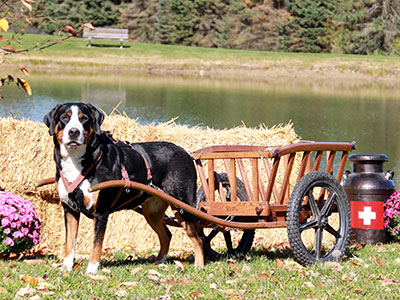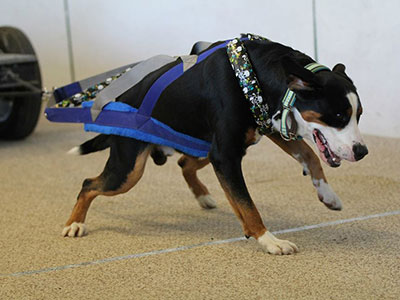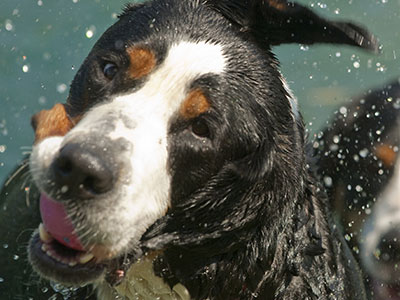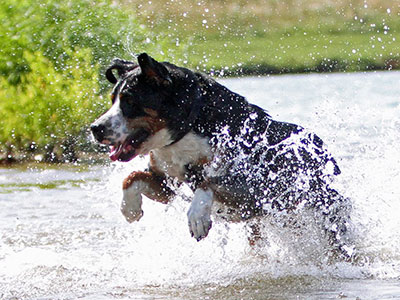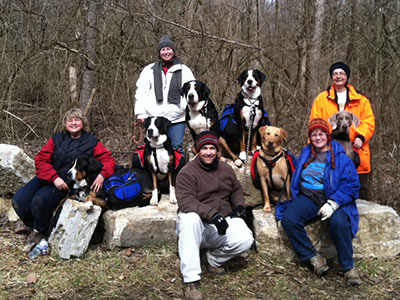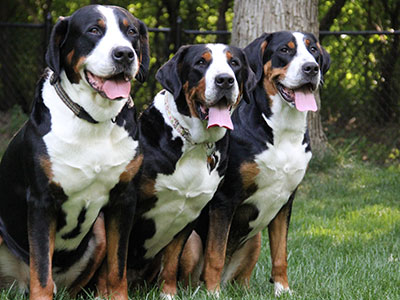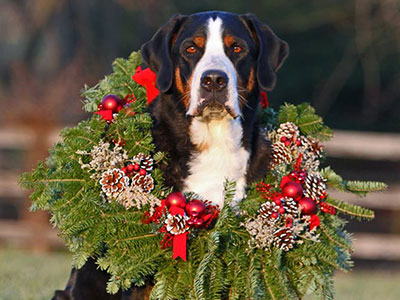Good Links for Information
Greater Swiss Mountain Dog Club of AmericaLots of good Swissy information
At the National club website you can find information on:
General Breed Information
Breed Standard
Health Concerns
Working Activities
And more!

TrainingTraining your Swissy
Swissies are a working breed that can be extremely intelligent but also challenging and stubborn to train. Your swissy will teach you a lot about becoming a better trainer.
AWESOME training articles by Suzanne Clothier
Whole Dog Journal
AKC Obedience Information and AKC Agility Information

NutritionFeed Your Swissy Right
Dogs are carnivores and are meant to eat a diet like nature intended, not one full of carbohydrates and highly processed ingredients. Whole, raw foods are what Swissies (and all dogs) thrive on.
Excellent information on Raw Feeding
More Excellent information on Raw Feeding
How diet can affect gene expression
My Pet Carnivore - Raw Food Supplier
Greater Swiss Mountain Dog or Swissy Product Recommendations
Follow this link for our specific product recommendations in regards to food, supplements, training, and more. Or, find custom designed Cherished Swissies logo and other seasonal Greater Swiss Mountain Dog items like shirts, sweatshirts, stickers, mugs, and more.
If you are looking for an 'easy' dog that you can just put out in the yard and bring in every once in a while or a dog that you can ignore during the work week and still have a well-mannered, perfectly trained dog on the weekends then the Swissy is probably not right for you. Adult Greater Swiss Mountain Dogs that have been well-socialized, taken through several levels of training classes, and taught proper manners are typically very sweet, loving, and make great pets. These are the type of dogs that everyone sees or hears about and thinks they want a Swissy because of them.
Those swissies didn't end up that way by magic though.
As puppies, Greater Swiss Mountain Dogs tend to be hard to house train, they tend to eat and/or chew things they aren't supposed to (which can lead to expensive obstruction surgeries), they require a lot of early socialization, and they require a lot of firm, consistent training. Some swissies will constantly test you to see who is going to be the leader of the house (especially for the first 2-3 years), you will need to make sure you understand how to train a large, intelligent, stubborn dog. Swissies need a lot of socialization, constant socialization throughout their lives is a definate plus, but early socialization as puppies is a necessity!
Greater Swiss Mountain Dogs were bred to be an all-purpose farm dog, they were supposed to watch out for things that were out of the ordinary and if you don't spend time when they are young exposing them to tons of different situations and people, then they will think that these things are meant to be 'warned' about and will be hesitant and often times vocal when exposed to new or different people, situations, or things. Even a well-socialized Swissy will often times go running up to strangers and stand a few feet from them and 'baroo' (a distinctive Swissy bark) right in their face before settling down for a visit. Pretty much all Swissies bark, some more than others. Ours are generally quiet in the house unless someone is knocking or they see someone walking by the front of the house. Outside they will let you know whenever your neighbors are out, or if anyone in the neighborhood has visitors.
Yes, Greater Swiss Mountain Dogs shed! Depending upon how much undercoat they have it can be a lot of hair! You will be sweeping your house constantly, they can be messy drinkers, and although they are a dry-mouthed breed they still will leave water all over your floor. Plus, as puppies they can pee HUGE puddles and the boys are notorious for walking while they pee so that they leave a trail from one end of the house to the other. If you aren't ready to be cleaning up puppy pee multiple times a day (until 4 - 6 months of age, sometimes longer) then don't purchase a swissy puppy. No matter how many puppies you have raised, a Greater Swiss Mountain Dog puppy will prove to be a tough housebreaker - prepare yourself in advance!
Greater Swiss Mountain Dogs need to feel like they are part of the family, they do not make good outdoor dogs (and they HATE the heat!). We will not sell a puppy to anyone who plans to keep their dog outside, we don't feel like this is a good situation for the puppy to grow up in, and if all you want is an outdoor watch-dog or a livestock guardian breed, there are several breeds that are much better suited for the task. Most swissies have way too much prey drive to make a good livestock guardian dog.
Greater Swiss Mountain Dogs can be great dogs, but it definitely takes work and training to get them that way. The first time many people meet their first Greater Swiss Mountain Dog they are impressed by their sweet demeanor and stunning good looks, but keep in mind that the reason you probably met them is because their people were devoted to socializing them and making sure they were out exercising and meeting new people all the time! Swissies love to have a job, just because they aren't your typical obedience type breed doesn't mean they don't like to work, you just have to be creative in finding the things they like to do best.
When thinking of pro's and con's of different breeds, take into account what they were bred to do. You can train a dog to fit into your lifestyle; however, taking into account what has historically been a breed's job will give you an idea of traits that have a higher likelihood of inherently being a part of your puppy's genetic make-up (and thus harder to change).
Greater Swiss Mountain Dogs were all-purpose farm dogs that were bred to pull the farmer's cart to market, watch over the farm and give a warning about strange situations or strangers, and possibly help move the farmer's livestock. These jobs mean that the Swissy inherently likes to pull (you will have to work hard and be very consistent about loose leash walking) and will not be an easy dog for a child to ever take for a walk in the neighborhood. They watched over the farm and warned about strange happenings - which means if you are looking for a quiet dog that will just sit and watch the neighborhood going-ons without a peep - this is not the breed for you. Swissies were bred to alert their family and most of them take this job very seriously. Swissies were also sometimes used to drive livestock - meaning they would follow behind the herd and keep them moving in the direction the farmer wanted. They didn't traditionally 'herd' livestock like a border collie, they were 'drovers'. What this translates to is that a lot of Swissies will instinctively want to drive your children or other smaller pets - i.e. bark at them and/or chase them to get them moving and keep them moving. This is something to keep in mind if you have small children - this drive seems to vary from swissy to swissy but can be very strong and hard to train out of some of them. Swissies should never be mean, agressive, shy, or have a tendency to bite - they are supposed to be a 'bold, faithful, willing worker'. But keep in mind a breed's original purpose when deciding which breed is right for you - it will go a long way in helping you to make the right decision and also help you in understanding your dog or puppy as they grow!



